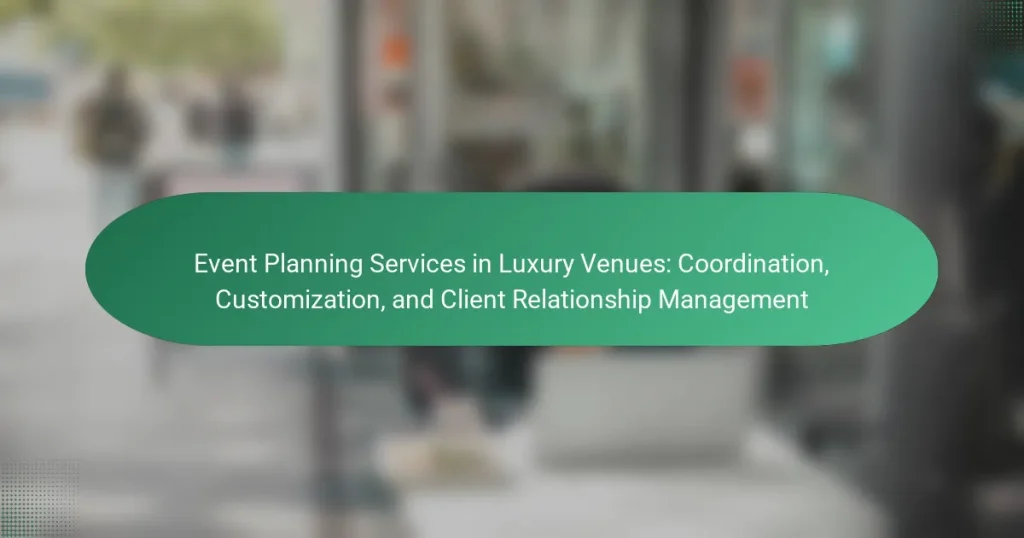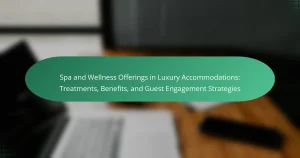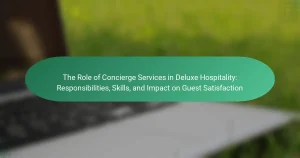Event planning services in luxury venues focus on organizing and managing high-end events, ensuring a seamless experience through logistics coordination, vendor management, and on-site execution. These services are tailored to meet client preferences, incorporating unique themes, decor, and catering options. Luxury venues enhance events with their elegant atmosphere, superior amenities, and exquisite architecture, significantly impacting guest satisfaction and engagement. Technology plays a crucial role in streamlining communication and project management, utilizing tools like event management software and cloud-based platforms to improve coordination and efficiency. Overall, the combination of luxury venue features and advanced technology contributes to the success of high-end events.

What are Event Planning Services in Luxury Venues?
Event planning services in luxury venues involve the organization and management of high-end events. These services include coordination of logistics, vendor management, and on-site event execution. Professionals in this field ensure a seamless experience for clients and guests. They customize events to meet the specific desires of clients. This may involve unique themes, decor, and catering options. Luxury venues often provide exclusive amenities and services. Event planners leverage these features to enhance the overall experience. Statistics show that well-managed events can increase client satisfaction by up to 30%.
How do Event Planning Services enhance luxury events?
Event planning services enhance luxury events by providing expert coordination, tailored experiences, and exceptional client relationship management. These services streamline logistics, ensuring that every detail is meticulously arranged. Professional planners leverage their industry connections to secure exclusive venues and high-quality vendors. They customize event elements to reflect the client’s vision and brand, creating a unique atmosphere. Additionally, planners manage budgets effectively, maximizing value while minimizing stress for clients. Their experience allows for seamless execution, ensuring that events run smoothly and meet high expectations. Statistics show that events planned by professionals often receive higher satisfaction ratings from attendees.
What specific services are included in luxury event planning?
Luxury event planning includes a range of specific services designed to create high-end experiences. These services typically encompass venue selection, catering coordination, and decor design. Additionally, luxury event planners offer personalized event themes and entertainment booking. They also manage logistics such as transportation and accommodations for guests. A dedicated event coordinator is often provided to oversee all details. Customization options are tailored to meet the client’s preferences and requirements. Furthermore, luxury event planning often includes on-site management during the event. These services ensure a seamless and memorable experience for clients and their guests.
How do these services differ from standard event planning?
Luxury event planning services differ from standard event planning by offering tailored experiences and high-end resources. These services focus on customization to meet specific client needs. They provide exclusive access to luxury venues and premium vendors. Additionally, luxury planners often deliver personalized service and attention to detail. This level of service includes bespoke decor and unique entertainment options. Standard event planning typically follows a more generic approach. It may not prioritize individual client preferences or high-end resources. Luxury services also emphasize relationship management with clients for ongoing support. In contrast, standard planning may lack this level of engagement.
Why choose luxury venues for event planning?
Luxury venues enhance event planning by providing an exceptional atmosphere and high-quality services. These venues often feature exquisite architecture and elegant decor. They offer top-notch amenities, including advanced technology and catering options. Attendees experience a sense of exclusivity and prestige at luxury venues. This can elevate the overall impact of the event. According to a study by Eventbrite, 70% of attendees feel more valued at upscale venues. Additionally, luxury venues often have experienced staff dedicated to ensuring seamless execution. This expertise contributes to a successful event experience.
What unique features do luxury venues offer?
Luxury venues offer exclusive amenities and personalized services. These venues often feature bespoke event spaces tailored to individual client needs. High-end audiovisual technology is standard, enhancing the overall experience. Exceptional catering options are available, often crafted by renowned chefs. Unique decor elements are frequently customizable, allowing for distinct themes. Attentive staff provide dedicated service, ensuring seamless event execution. Many luxury venues include private areas for VIP guests, enhancing privacy and exclusivity. These features collectively create an unparalleled atmosphere for events.
How do luxury venues impact the overall event experience?
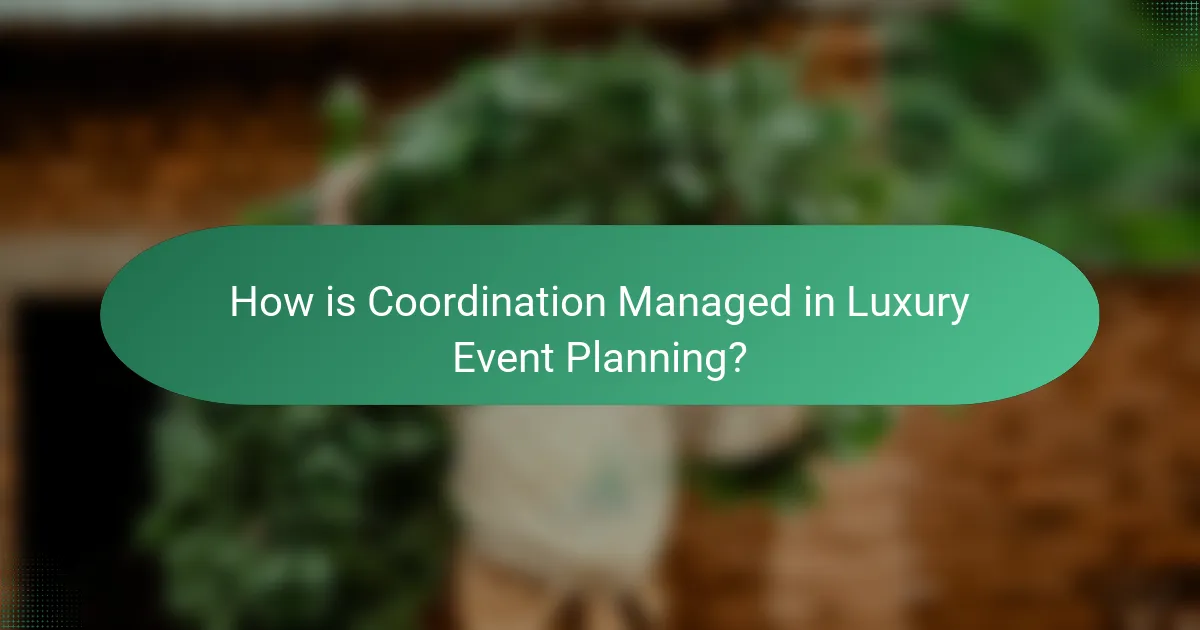
How is Coordination Managed in Luxury Event Planning?
Luxury venues significantly enhance the overall event experience. They provide an elegant atmosphere that elevates the perceived value of an event. High-end venues often feature exquisite architecture and luxurious decor. These elements create a memorable backdrop for guests. Additionally, luxury venues typically offer superior amenities and services. This includes high-quality catering, advanced technology, and personalized service. Such offerings contribute to guest satisfaction and enjoyment. Studies show that venue quality directly correlates with attendee engagement and overall event success. Therefore, selecting a luxury venue can be a pivotal decision in event planning.
What are the key elements of effective event coordination?
Effective event coordination involves several key elements. First, clear communication is essential among all stakeholders. This includes clients, vendors, and team members. Second, thorough planning ensures every detail is accounted for. This includes timelines, budgets, and logistics. Third, flexibility allows coordinators to adapt to unexpected changes. Events often require quick decision-making to stay on track. Fourth, strong organizational skills help manage multiple tasks simultaneously. This is crucial for maintaining order during the event. Finally, attention to detail ensures that every aspect meets the client’s expectations. These elements collectively contribute to successful event coordination in luxury venues.
How do timelines and schedules influence event success?
Timelines and schedules are critical for event success. They ensure that all tasks are completed on time. A well-structured timeline helps in resource allocation. It allows for coordination among team members. Schedules provide clear deadlines for vendors and staff. This minimizes the risk of last-minute issues. According to a study by the Project Management Institute, 70% of successful projects are attributed to effective scheduling. Timelines also facilitate communication with clients. Clients are more satisfied when they see progress on schedule. Overall, timelines and schedules significantly enhance the likelihood of a successful event.
What roles do vendors play in the coordination process?
Vendors play crucial roles in the coordination process of event planning. They provide essential services such as catering, audiovisual support, and decor. Each vendor contributes specific expertise that enhances the overall event experience. Coordination among vendors ensures seamless execution of the event. Event planners rely on vendors for timely delivery and setup of services. Effective communication between planners and vendors is vital for addressing any issues. Vendors also help in adhering to budgets and timelines. Their collaboration ultimately leads to a successful event outcome.
How do planners ensure seamless communication during events?
Planners ensure seamless communication during events by implementing structured communication strategies. They utilize tools such as walkie-talkies, mobile apps, and event management software to facilitate real-time updates. Regular briefings and debriefings are scheduled to keep all team members informed. Clear communication channels are established to address any issues promptly. Planners also create detailed event timelines that outline responsibilities and points of contact. They often designate a communication lead to manage information flow. This structured approach minimizes misunderstandings and enhances coordination. Studies show that effective communication can improve event outcomes significantly, leading to higher client satisfaction.
What tools are used for communication and coordination?
Communication and coordination tools used in event planning include email, instant messaging apps, and project management software. Email facilitates formal communication with clients and vendors. Instant messaging apps, like Slack or WhatsApp, enable quick, real-time discussions among team members. Project management software, such as Trello or Asana, helps organize tasks and timelines effectively. These tools enhance collaboration and streamline the planning process. They are essential for maintaining clear communication and ensuring all team members are aligned on event details.
How does technology enhance coordination efforts?
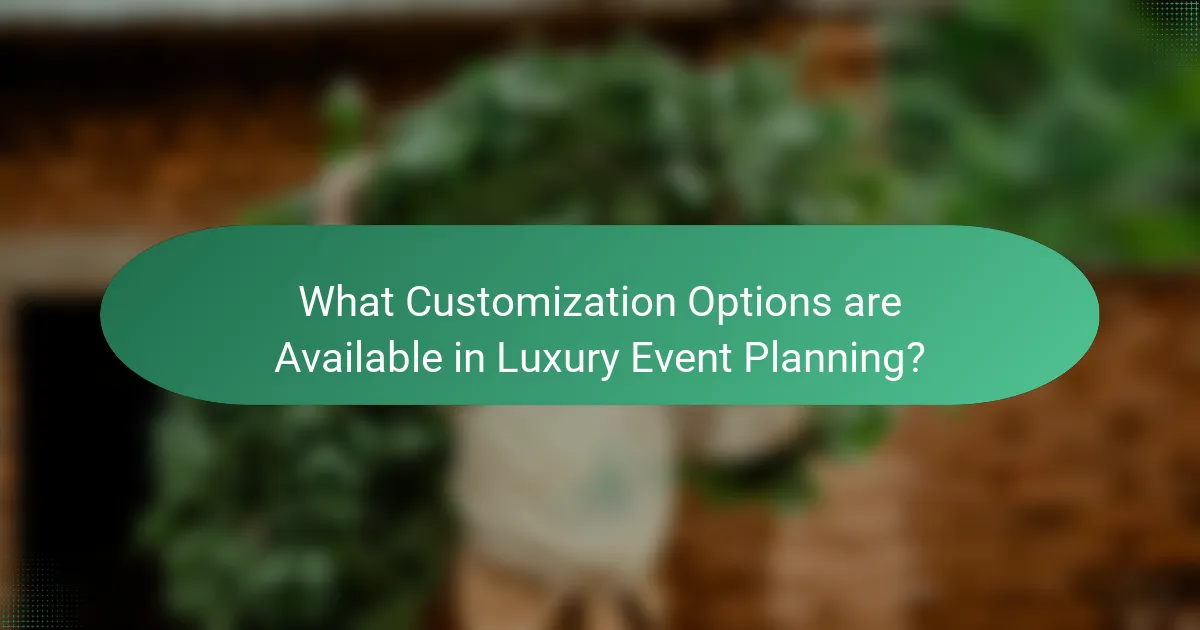
What Customization Options are Available in Luxury Event Planning?
Technology enhances coordination efforts by streamlining communication and improving project management. Tools such as event management software facilitate real-time updates among team members. This ensures everyone is aligned on tasks and timelines. Additionally, cloud-based platforms allow for document sharing and collaboration from any location. Automation of scheduling and reminders reduces the risk of missed deadlines. Data analytics can track progress and identify potential issues early. Virtual communication tools enable seamless interaction between clients and planners, enhancing responsiveness. Overall, technology fosters efficiency and clarity in coordination efforts.
How can events be tailored to meet client preferences?
Events can be tailored to meet client preferences through personalized planning and careful attention to detail. Understanding the client’s vision is essential. Conducting thorough consultations helps gather specific requirements. This includes preferences for themes, venues, and activities.
Utilizing client feedback during the planning process ensures alignment with their expectations. Incorporating unique elements, such as custom menus or décor, enhances the overall experience.
Data from industry surveys indicates that 75% of clients value personalized touches in event planning. This personalization fosters a deeper connection between the client and the event. Ultimately, tailoring events to client preferences leads to higher satisfaction and successful outcomes.
What types of customization are most popular in luxury events?
Popular types of customization in luxury events include personalized decor, tailored menus, and bespoke entertainment options. Personalized decor often features custom floral arrangements and unique table settings. Tailored menus are designed to meet individual client preferences, including dietary restrictions. Bespoke entertainment options may include live performances or curated experiences. These customizations enhance the exclusivity and uniqueness of each event. Statistics show that 80% of luxury event planners prioritize customization to meet client expectations. This trend reflects a growing demand for unique, memorable experiences in the luxury market.
How do planners incorporate personal touches into events?
Planners incorporate personal touches into events by customizing elements to reflect the client’s personality and preferences. They gather information through consultations to understand the client’s vision. This may include personalized themes, color schemes, and decor choices. Planners often integrate meaningful symbols or items that resonate with the client. They may also curate unique experiences, such as custom menus or entertainment options. Attention to detail is crucial, ensuring that every aspect aligns with the client’s story. Client feedback is actively sought during the planning process to refine these personal touches. This approach enhances the overall experience and creates memorable events that feel unique to the client.
Why is customization important for client satisfaction?
Customization is important for client satisfaction because it tailors services to individual preferences. Personalized experiences enhance emotional connections between clients and service providers. Clients feel valued when their specific needs are acknowledged and met. According to a study by Deloitte, 80% of consumers are more likely to make a purchase when brands offer personalized experiences. Customization can lead to increased loyalty and repeat business. Satisfied clients often share their positive experiences, enhancing a brand’s reputation. In luxury event planning, attention to detail and personal touches are crucial for exceeding client expectations. This leads to memorable events that resonate with clients.
How does customization affect the overall event theme?
Customization significantly shapes the overall event theme. It allows for a tailored experience that aligns with the client’s vision. Custom elements can include décor, color schemes, and entertainment choices. These personalized aspects enhance the event’s atmosphere and engagement. For example, a corporate event can reflect a brand’s identity through customized branding elements. This alignment increases attendee connection and satisfaction. Studies show that personalized events lead to higher attendee retention and positive feedback. Customization ultimately transforms a standard event into a memorable experience.
What are some examples of successful customized events?
How do Client Relationship Management practices enhance event planning?
Successful customized events include corporate retreats, personalized weddings, and bespoke product launches. Corporate retreats often feature tailored team-building activities and unique venue selections. Personalized weddings are designed around the couple’s preferences, including themes and décor. Bespoke product launches create immersive experiences that reflect the brand identity. These examples demonstrate the effectiveness of customization in enhancing attendee engagement and satisfaction. Customization leads to memorable experiences that resonate with participants.
What strategies are effective for building strong client relationships?
Effective strategies for building strong client relationships include clear communication, personalized service, and consistent follow-up. Clear communication fosters trust and understanding. It ensures that clients feel heard and valued. Personalized service tailors experiences to meet individual client needs. This approach enhances satisfaction and loyalty. Consistent follow-up demonstrates commitment and care. It allows for addressing concerns promptly and reinforces the relationship. Research shows that 70% of clients prefer personalized interactions. This statistic highlights the importance of customization in client relationships.
How do planners gather and utilize client feedback?
What are best practices for successful event planning in luxury venues?
Planners gather client feedback through surveys, interviews, and post-event evaluations. Surveys are often distributed after events to assess client satisfaction. Interviews allow for in-depth discussions about client experiences and preferences. Post-event evaluations provide insights into what worked well and what could be improved. Planners utilize this feedback to enhance future events and tailor services to client needs. For instance, data from surveys can identify popular features or areas needing improvement. This process fosters stronger client relationships and ensures higher satisfaction rates.
Event planning services in luxury venues encompass the organization and management of high-end events, focusing on logistics, vendor management, and customized experiences. This article explores how these services enhance luxury events through expert coordination, tailored experiences, and effective client relationship management. Key elements discussed include specific services offered, differences from standard event planning, and the impact of luxury venues on overall event success. Additionally, the article highlights the importance of customization in client satisfaction and outlines best practices for successful event planning in luxury settings.
